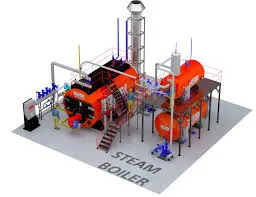
ທ.ວ. . 04, 2024 13:05 Back to list
high pressure boiler types
Understanding High Pressure Boiler Types
High pressure boilers are essential components in various industries, playing a critical role in generating steam or hot water at elevated pressures. Unlike their low-pressure counterparts, high pressure boilers operate above 15 psi, which allows them to produce steam capable of driving turbines for electricity generation, providing heat for industrial processes, or powering machinery. This article explores the different types of high pressure boilers, their applications, and some key considerations in their operation.
Types of High Pressure Boilers
High pressure boilers can be categorized based on their design, operation, and fuel type. Here are the primary types
1. Water-Tube Boilers In water-tube boilers, water is contained in tubes, which are surrounded by hot combustion gases. As the flames and hot gases pass around the tubes, the heat is transferred to the water, converting it into steam. Water-tube boilers are highly efficient and can produce steam at very high pressures, making them suitable for large-scale power plants. They can handle high pressure and temperature, making them ideal for critical applications where quick responses to load changes are required.
2. Fire-Tube Boilers Conversely, in fire-tube boilers, hot gases travel through tubes that are submerged in water. This type of boiler is generally used for lower pressure applications but can still be classified as a high pressure boiler if designed accordingly. Fire-tube boilers are typically simpler and less expensive than water-tube designs, but they may not be as efficient or capable of producing steam at as high pressures and rates as their water-tube counterparts.
3. Packaged Boilers Packaged boilers are pre-assembled and factory-tested systems designed for easy installation and operation. They are typically water-tube or fire-tube designs and are favored for their compact size and efficiency. These boilers are often used in various industrial applications, including food processing, chemical production, and steam generation.
4. Electric Boilers While not traditional in the fossil-fuel sense, electric boilers can also produce high-pressure steam. They utilize electrical energy to heat water directly and are favored in situations where quick startup and precise control over steam quality are required. Electric boilers are becoming increasingly popular due to their efficiency and low emissions.
high pressure boiler types

Applications of High Pressure Boilers
High pressure boilers have a wide range of applications. In the power generation sector, they are crucial for generating electricity by converting steam energy into mechanical energy in turbines. Industries such as oil and gas, petrochemicals, and pharmaceuticals rely on high pressure steam for various processes, including heating, sterilization, and chemical reactions.
Additionally, high pressure boilers are commonly used in district heating systems to provide residential and commercial buildings with hot water and heating. The efficiency of these systems is enhanced by the ability to operate at high pressures, allowing for better heat distribution.
Considerations in Operation
While high pressure boilers are highly beneficial, they come with specific operational considerations. Safety is of utmost importance due to the high temperatures and pressures involved. Regular maintenance and inspections are crucial to ensure the integrity of the boiler system and to prevent accidents. Operators must be trained to understand the critical pressures, temperatures, and water quality parameters needed for efficient and safe operation.
Moreover, the choice of fuel can significantly impact the efficiency and environmental footprint of a high pressure boiler. The shift towards cleaner energy sources, including natural gas and renewable energy, is a growing trend that affects boiler design and operation.
Conclusion
High pressure boilers play a pivotal role in modern industry, providing essential steam and heat for a myriad of applications. Understanding the different types of high pressure boilers and their specific applications helps in making informed decisions about their use and operation. As industries continue to evolve, advancements in boiler technology will likely lead to even more efficient and environmentally friendly solutions. Whether in energy production or industrial processes, high pressure boilers remain a cornerstone of operational efficiency and safety in various sectors.
-
Best Steam Boiler Design PDF Free Design Calculation & Diagram Downloads
NewsJun.10,2025
-
Hot Boiler Water Heater Efficient Heating Solutions for Home & Commercial Use
NewsJun.10,2025
-
Steam Boiler Safety Devices High-Quality Protection Valves
NewsJun.10,2025
-
Ultimate Steam Boiler Checklist for Safety & Efficiency
NewsJun.10,2025
-
Optimal Hot Water Boiler Temperature Setting Guide
NewsJun.10,2025
-
Effective Hot Water Boiler Chemical Treatment Protect & Maintain
NewsJun.09,2025
Related PRODUCTS






















